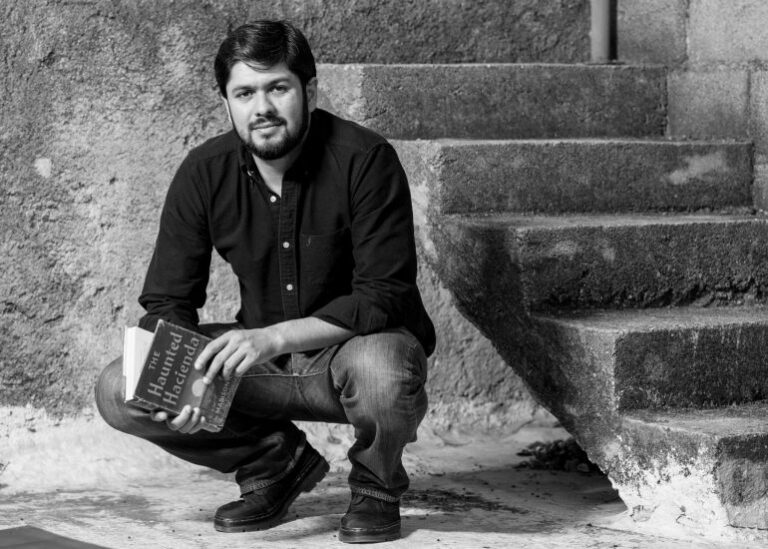A Body that is Ultra-Body: In Conversation with Fred Moten and Elysia Crampton
In a blog series for Ploughshares, I ask a poet and a non-poet the same questions. These questions have been culled from past interviews with artists by artists. The three questions below were selected from interviews with artist Shezad Dawood, sculptor Nick Cave, and writer Maggie Nelson, respectively.
This month, I interviewed poet and theorist Fred Moten and avant-electronic producer, Elysia Crampton on history, fiction, embodiment, and the concept of equality.
Crampton’s sophomore album, Elysia Crampton Presents: Demon City is set to be released July 22nd on Break World Records. The track featured below is the fourth on the album.
Tell me about your thoughts on the relationship between history and fiction.
Elysia Crampton: The fictions that we create are only possible from what informs them–the actual, bodied, historical monsters that produced them, produced the genes. Have you ever had one of those amazing dreams like, ‘I had no idea my mind could even go there’? It’s so ultra-deep, it’s so beyond your own concept of your own beyond. I feel like that’s how ancestral knowledge is and that’s how genetic memory works.
Fred Moten: I read history books a lot. I’m sure that there’s, of necessity, a fictional element to some of those books, even if they’re not meant to be thought of as works of fiction. There’s this book I’ve been reading called, The Half Has Never Been Told: Slavery and the Making of American Capitalism. There’s a way that [Edward Baptist] is using literary tropes as a way of telling the story he wants to tell. Often, historical books on American slavery attempt to show all the different ways in which the enslaved people are both radically interdicted from enjoying any kind of normative personhood. Then the opposite side of it is, people often try to show how they managed to achieve that kind of subjectivity against all those odds and against the grain of that interdiction. The first few chapters of [The Half Has Never Been Told] show that the fundamental problem with slavery in the United States in the 19th century wasn’t that it interdicted individual personhood on the part of the enslaved, but that it imposed individual personhood as a kind of regulative, parseable condition. But because the author is committed to the idea of individual freedom as the condition that the enslaved person wants to achieve, it creates this dissonance in the book. There’s these moments when you wish it were a little less novelistic. Not because I don’t like novels, but because there are a set of ideological and political assumptions that underlie the novel.
How, if at all, is your own body present in your work?
EC: Maybe I am trying to map out some sense of self and body that is ultra-body. A sense of self that is already there. There’s no language or mark for leaving a trace of it. It’s a little trickier. The hand that is there, that is also not mine, that includes me–say, in an edit I’ve made of five songs that aren’t mine and how, maybe a song where I did all the performance and all the editing is very [clearly] under the sovereign notion, very clearly mine. The [edit] isn’t so much mine. Yet my involvement, my hovering around it, my arranging through it is a mode of placement and geography, that also recognizes the movement of other bodies at the same time.
FM: The idea that there is such a thing as a discrete, individuated body is a fiction that we seem to live by, but I don’t really believe in it. That doesn’t mean that there isn’t a physical and material fleshly life and presence. I would respond to the question as if you had said, “How does your flesh manifest in the work?” Or, “How does fleshliness manifest itself in the work?” Hopefully everywhere, all the time. The work is meant to be sensuous. It’s supposed to get under your skin and on your skin and in your ear. All of that. My sense is that it’s working right if the flesh is everywhere in it, all the time, irreducible.
How is a body or person “equal” to another, or to anything else?
EC: Oh man, that’s a good question, but again, I don’t even really like that question.
I know. I sort of hate it too. (laughs)
EC: It’s good. We need to talk about how we hate the question. My whole life has always been about dis-identifying, or what I’ve learned is called dis-identifying. For me, [it] was just navigating life on life’s terms, you know, like any other queer person of color. Even when we say “equality,” it’s acknowledging the exclusionary-ness of that sovereign space, that freedom space, already, without us even having to acknowledge that word or that process. There is no acknowledging of that acknowledgment, or that gap. The gaps are what I really like. This colonial field that we’re born out of, where we’re meant to value and find and seek the solid object, to paint the background black so that we can find the spell or the virus and locate the object–and how that is a process of getting rid of all those gaps, and all the other things, all the clutter, the debris, that goes into that act of seeing. That is a very violent process. It’s one that removes in order to include. It also includes in order to exclude.
FM: What equality implies is the notion of relation and what relation implies is the notion of individuation. When I hear that phrase, “the black body,” I kind of want to say, “Well there’s no such thing,” or, if there is such a thing, it’s something that is imposed upon and conferred upon us at the moment of our death. The moment of death is also the moment of individuation. To me, that’s how come it was so horrific they left Michael Brown’s body on the street for so long. What it did was it imposed upon on us the radical knowledge of how fundamentally alone he was at that moment.

